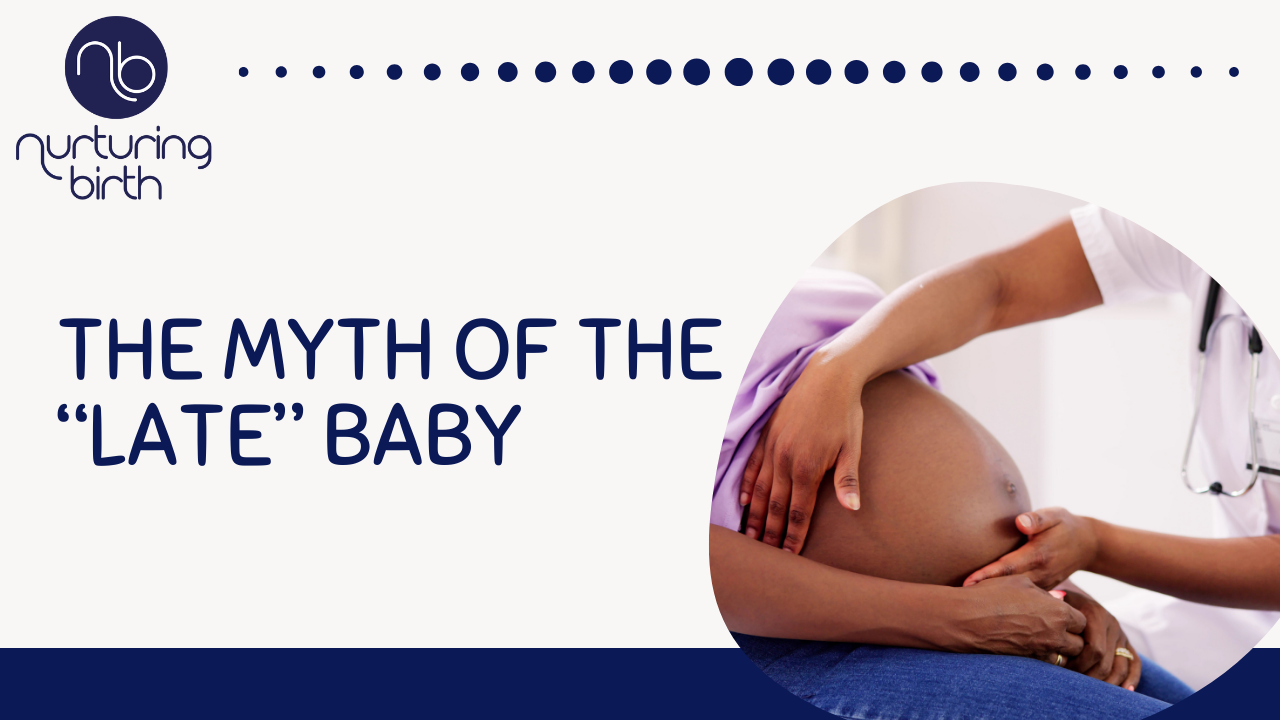
The Myth of The “Late” Baby
Jul 05, 2021How often do we see people posting on social media that their baby is ‘late’ or ‘overdue’, often with worries that their body just can’t do it, or that there is something wrong with them.
There is something very wrong with our medical system if women feel like failures if they haven’t birthed their babies by a due date, commonly known as an EDD (Estimated Delivery Date). Crucially, we need to recognise that the date is an estimation, a guess date – plucked from somewhere in the range of 37 and 42 weeks, those dates being the point at which pregnancy is considered full term.
Other countries choose different dates – France has long considered 41 weeks to be the guess date for birth, and that sits far better with us given that 65% of women will sail past their UK ‘estimated due date’ without the first sign of a twinge or show. However even 41 weeks is early for many pregnant women and people. Babies arrive in their own sweet time – women and people gestate for different lengths of time. There isn’t a point where pregnant stops being ‘normal’.
When are babies actually due?
Babies are born when their bodies, and particularly their respiratory systems, have matured. Research finally proved what people had believed for a long time, that components in the surfactant produced by the baby’s lungs enter the mother’s system and trigger the labour process to start. It is a beautiful symbiosis between mother and baby – two bodies working together. The process doesn’t need to be kick-started just because a pregnancy is lasting longer than average.
So why is pregnancy so often cut short when it might naturally go to 41 or 42 weeks or longer?
Research has tended to show that the rate of stillbirth rises very slightly after 42 weeks. Hilder et al (2008), for instance, found that stillbirth happened in:
Around 1/2000 pregnancies at 39 weeks
Around 2/2000 pregnancies at 40 weeks
Around 3/2000 pregnancies at 41 weeks
Between 3/2000 and 4/2000 at 42 weeks
Around 4/2000 at 43+ weeks
These increases are tiny, although of course catastrophic for any family affected by stillbirth. It is important to note that if doctors and midwives talk about ‘placentas failing after 40 weeks’ or other scary phrases that in fact the chance of it happening are still extremely small.
However, in an attempt to reduce this number further, induction of labour is now offered to every woman or person whose pregnancy is heading towards 42 (or 41, or even earlier) weeks. It’s important to know that although it’s always an offer that we can accept or decline, it may be said to you as something that you have to do, or are expected to do. However, the reality is that no one is allowed to decide whether to be induced other than you.
DO stillbirth rates increase after 42 weeks?
Every year, the actual stillbirth rate across the whole of the UK is collected and reported by an organisation called MBRRACE. This data tells us what actually happens rather than what research looks at, which is what we think is most likely to happen. Research isn’t always right. The MBRRACE data shows us that in eight out of the past ten years, the stillbirth rate dropped when women and people got to 42 weeks pregnant! And in the other two years, the stillbirth rate at 42 weeks pregnant was about the same as at 41 weeks.
The birth campaign charity AIMS wrote about this in their report, “Induction at term – how great is the risk of refusing it?”
This was a shocking finding, as it went against what most people think about stillbirth and long pregnancies, but the data is accurate.
It’s important to remember that because MBRRACE’s data is real-world data, most babies who were showing signs of a problem would have already been born by induction or caesarean before 42 weeks. This means that if there are no medical indications for induction of labour, and if the pregnant woman or person is happy to continue with their pregnancy, this data shows that the chance of completely unexpected stillbirth doesn’t increase at 42 weeks.
Have you had your baby yet?
Family and friends asking if you’ve had your baby, or asking when you’re going to be induced (whether you want to be or not!) can be exhausting. How could we make that time at the end of pregnancy easier? What would make women and people feel better about themselves and more positive towards their bodies?
Firstly, knowing that the decision to accept and offer of induction belongs solely with the pregnant woman or person can be helpful, so they don’t feel they have to be induced if they don’t want to be.
Secondly, knowing the data from MBRRACE can be reassuring when pregnancy lasts longer than expected. Research data is also reassuring. When we are told that stillbirth rates “soar” or “double”, knowing that this may mean 1/2000 to 1/1000 babies can feel less worrying.
But thirdly, would it help if this pressure to give birth by a particular date was removed? Could we give women and people an estimated due month instead? Is there a way that we could nurture and support women and people in these last days and weeks so that they can empower themselves, and feel that they are right where they need to be, without the emotive words “overdue” and “late” hanging over their heads?
If you’ve got any brilliant ideas about how we can change the current state of play we would love to know!
Credit to Sophie Brigstocke, former director of Nurturing Birth and Emma Ashworth, freelance writer on birth and breastfeeding-related topics with a special interest in human rights in pregnancy and birth. She is the author of The AIMS Guide to Your Rights in Pregnancy and Birth.
Learn more about the Nurturing Birth Doula Training Experience
Free download available NOW!
We hate SPAM. We will never sell your information, for any reason.


